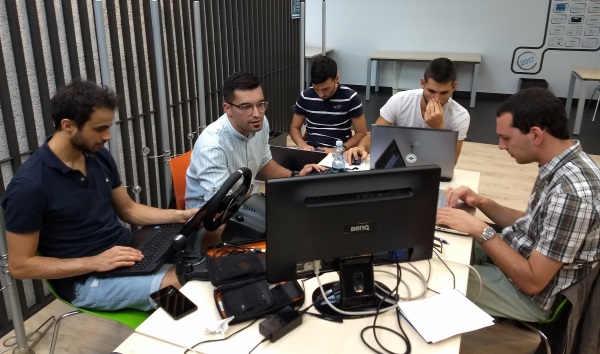A team of Computer Engineering students from Politecnico di Torino successfully participated to the "1° MEC Hackathon & Conference" event, that took place in Torino (at I3P) on Tuesday, Semptember 18, 2018 and that was supported by enterprises such as Intel, Vodafone, Saguna, Hawei.
The theme of the Hackathon was focused on the MEC (Multi-access Edge Computing) standard, developed by ETSI as a platform for developing distributed applications, that integrate cloud component, edge nodes, and terminal devices. In particular, the hackathon focused on applications in the Automotive field of the MEC protocols and infrastructure.
Five brave Politecnico students accepted the challenge posed by the hackathon: they are Fabio Cermelli, Eugenio Gallea, Lorenzo Moro, Stefano Roagna, and Nunzio Turco. Fabio and Lorenzo are also members of the IEEE Eta-Kappa-Nu association. Working together and combining their specific individual skills, they built a prototype of a system, called Jarvis, that they describe as follows:
"Our idea aims at being a help for the drivers, especially the novice ones, end in particular to notify possible dangers in upcoming intersections. By exploiting the MEC technology we may notify, nearly in real time, the drivers of other approaching vehichle that could constitute a danger. The intelligence that we added to the infrastructure allows us to provede the data for computing vehicle position and speed, and to detect when such situations might happen. The MEC is then used also to broadcast a warning to all vehicles in a certain area.”
The project has been awarded the possibility of implementing and testing it on the “Smart Roads” infratstructure of the City of Torino.
Un team di studenti di Ingegneria Informatica del Politecnico di Torino ha partecipato con successo all'evento "1° MEC Hackathon & Conference" tenutosi a Torino (presso I3P) martedì 18 settembre 2018 e supportato da aziende come Intel, Vodafone, Saguna, Hawei.
Il tema della Hackathon era lo standard MEC (Multi-access Edge Computing) sviluppato da ETSI come piattaforma per lo sviluppo di applicazioni distribuite, che integrino componenti cloud, nodi edge e dispositivi terminali. In particolare, l'hackathon si concentrava sulle applicazioni in campo Automotive dei protocolli e dell'infrastruttura MEC.
Cinque coraggiosi studenti del Politecnico hanno raccolto la sfida lanciata dall'hackathon: si tratta di Fabio Cermelli, Eugenio Gallea, Lorenzo Moro, Stefano Roagna e Nunzio Turco. Fabio e Lorenzo sono anche membri dell'associazione IEEE Eta-Kappa-Nu. Lavorando insieme e combinando le proprie competenze specifiche, hanno costruito il prototipo di un sistema, denominato Jarvis, che descrivono così:
"La nostra idea ambisce ad essere un aiuto per i guidatori, soprattutto quelli alle prime armi, in particolare per consentire la notifica di eventuali pericoli nelle prossimità di un incrocio. Sfruttando la tecnologia MEC possiamo avvisare quasi real-time gli autisti di eventuali altri veicoli in avvicinamento che costituirebbero un pericolo. L’intelligenza aggiunta da noi all’infrastruttura ci permette di fornire i dati relativi al veicolo (posizione e velocità) al fine di calcolare quando si potrebbero verificare tali situazioni, mentre quello per il quale utilizziamo MEC è una sorta di avviso a tutti i veicoli in una certa area.”
Il progetto è stato premiato con la possibilità di essere implementato e testato sull’infrastruttura “Smart Roads” del Comune di Torino.
More information:
- ETSI MEC Standard
- Developer resources "ETSI Forge"
- Presentation slides for the Jarvis prototype
- GitHub repositories with the prototype:server, client


